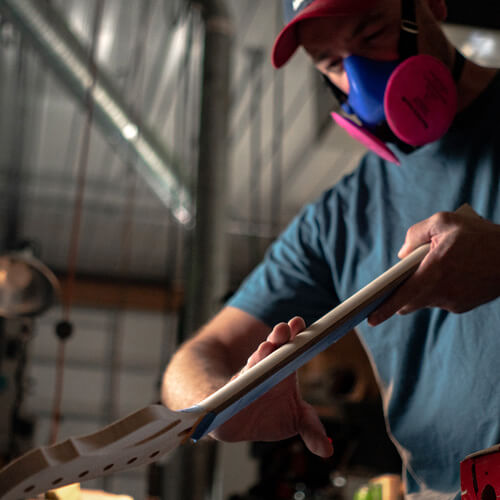Conservation Conversations
Topic 3: the Instrument Building Industry
Q&A with Jonathan Miller, founder of Born Guitars
People play an essential role in protecting the environment; not only those who conserve nature on the ground but those who have made it their mission to merge sustainability with art and craftsmanship, specifically music and guitar building.
Welcome to our series where we’re taking you into the, sometimes touchy, subjects that surround environmental protection in the hopes of providing you with information and knowledge on viable solutions for a sustainable future.
In this third conversation, who better to ask about how to prioritize nature’s needs while working as a luthier than WILD Board Member and founder of Born Guitars, Jonathan Miller.
 Jonathan (Jay) Miller grew up near Chicago and moved to Colorado to chase his dream of building a better custom guitar company. Born Guitars emphasizes sustainability in all aspects of their workshop. His passion for the environment and music keep Born Guitars pushing forward. Much like WILD, Born has always been about creating connections – to an instrument, to music, and to our planet. Let’s get into it…
Jonathan (Jay) Miller grew up near Chicago and moved to Colorado to chase his dream of building a better custom guitar company. Born Guitars emphasizes sustainability in all aspects of their workshop. His passion for the environment and music keep Born Guitars pushing forward. Much like WILD, Born has always been about creating connections – to an instrument, to music, and to our planet. Let’s get into it…Can you share a little more about how you decided to merge your two passions (music and the environment) together? Did it come naturally?
Growing up you could often find me messing around in my dad’s workshop, and helping him with projects while we listened to music. In high school, I picked up the guitar and started jamming to my dad’s old vinyl records. Ultimately, my interest in music and my affinity for hands-on work were the catalysts that prompted me to start a guitar company. In 2007, I was making good money in the finance industry, but my heart was calling me to do something I was really passionate about. I decided then that no matter how big and scary it might be to jump careers and start a completely new adventure in life, I would put my energy into something I not only enjoy, but that would hopefully send ripples of positive changes across America and beyond.
To make a long story short, guitar building came very naturally to me because the underlying skills were already there, and ultimately it was the best decision I’ve ever made. Aligning my passions, skills and values immediately led to more ambition, personal growth and happiness. My conviction to build more sustainable guitars, without sacrificing quality, and move forward into the unknown has allowed me to challenge the status quo and start creating those ripples.
What challenges have you faced in trying to source more sustainable materials? How have you overcome these obstacles?
Making sustainability a priority as a small business can be easier in some ways because there’s not much internal red tape, but it is also much more difficult due to the amount of time and money it takes to develop more sustainable practices. I find this to be a bit of a paradox in the industry – large corporations have the most resources and ability to make sweeping changes, but, unfortunately, they also tend to be the slowest to adopt changes.
Small businesses are kind of like ambitious grad students looking to make an impact by burning the midnight oil, and large corporations are more like a bratty teenager that doesn’t do anything unless socially “cool.”
Sourcing more sustainable materials is a challenge because even on the business to business side of purchasing there can be a lot of green jargon and green washing language. I find that most companies have a sustainability pitch these days, but only a handful can really speak to why they are sustainable, and exactly how their products and raw materials are sourced. Sourcing wood is particularly difficult because there is a lot of misrepresentation that staying within the boundaries of the law is somehow the same thing as being sustainable. Finding lumber suppliers who understand ecosystems, have a priority on long term health of the forest they harvest from, and that can track a log from forest to sawmill takes a lot of due diligence, especially when sourcing lumber from overseas.
I am continually learning more every year about wood species, their habitats, sourcing methods, the sustainability of harvesting methods, and which suppliers truly have a priority to protect forests and the local communities that rely on them. Every time I order wood I go through a due diligence process, even with existing suppliers, to review critical information relating to sourcing every board of lumber we purchase.
In the early days, I used to rely more on suppliers word and certifications such as “FSC (Forest Stewardship Council) certified” to determine if wood we sourced was being harvested sustainably, but unfortunately even organizations dedicated to sustainability can be manipulated and used to create a false sense of “doing the right thing.”
Today we simply will not offer species that we do not feel confident are being harvested sustainably, and furthermore we don’t supply species that are endangered and risk further detriment if their use is promoted in the guitar industry.
Besides wood, guitar finishes are a major source of pollution. Most guitar companies utilize nitrocellulose and car industry finishes to achieve the bright colored glossy finishes that consumers demand. It has been strictly through determination that we have learned to use more environmentally friendly water-based finishes to achieve the same result. Companies use car finishes because they are extremely production friendly and rapidly create excellent results. The problem is they require tons of harsh chemicals to make them easy to spray and cure into ultra hard glossy car finishes. Our water based and oil based finishes are non-hazardous, and clean up easily without the use of any harmful chemicals.
Believing in myself, and having the conviction to push my dreams forward, no matter the obstacle, has given me the perseverance to overcome the challenges I’ve faced in manufacturing high-end custom guitars, and driving sustainability as a top priority throughout Born Guitars®.
Do you see others in the industry following suit?
Yes and no. As I mentioned before, everyone is talking the talk, but there are varying degrees of commitment to sustainability in practice. Companies like Taylor Guitars are using their resources to make measurable changes within the industry and to promote alternative, more sustainable materials, to their customers and even competitors. Other companies, such as the top 3 in the electric guitar industry, mainly give lip service to sustainable initiatives and are more driven by consumer trends. Are any of us perfect? No. Born Guitars and companies like Taylor Guitar can always do better, and that’s the mentality we maintain. Sustainability is a process, not a goal that is obtained.
Do you find that customers and the music community are becoming more environmentally minded?
Compared to 10-20 years ago I would say yes, but it is a slow process. In the early 2000s, I would get laughed at for suggesting that alternative and that more sustainable wood sources could be used in guitars AND that anyone would buy them. Today more consumers are seeing unique wood species as an opportunity to make a difference or speak to their own personality. By 2014, big companies were testing out alternative wood species because Born Guitars was creating ripples and chatter around guitars made of Salvaged Port Orford Cedar and Myrtlewood, for example. Guitar companies continue to dabble in alternative materials, but these trends tend to still lie on the fringes of popular guitar designs. The guitar industry and consumer trends lean heavily towards vintage goods, and in doing so have been fairly resistant to change for decades. Straying from the guitar woods, and even brands, that have helped legendary guitarists create the music we love and cherish may even be considered sacrilege to some. I suppose the guitar culture’s resistance to change is similar to the resistance other cultures have to change, and is what makes conservation and sustainability so challenging. It’s not that we don’t have the technology and “know how” as a society, but people are fond of their traditions and resistant to give them up whether they have become detrimental to their health or the environment. For example, shark fin soup is linked to the devastation of shark populations around the world and has broad effects on the environment, but due to the soup’s cultural ties and perceived health benefits it has become a highly polarizing issue simply getting people to stop eating it.
What’s your number one tip for fellow instrument craftsmen who are looking to become more sustainably minded in their craft?
Today it is easier than ever to integrate more sustainable practices and materials into your instruments, and it will continue to be easier the more consumers, craftsmen and businesses demand sustainable products and materials. It will take a little bit more effort to research and vet the products and materials that go into your craft, but in the long run your health and the impact you’ve made will be well worth it!
Learn more about Born Guitars.
Find them on Instagram @bornguitars.
Did you enjoy this third conversation of the series? Please let us know in the comments if there is a community you would like us to address.

0 Comments